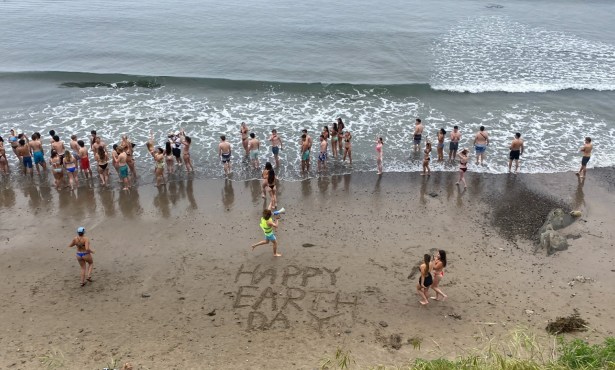Feds Seek to Reverse Offshore Fracking Moratorium off California Coast
Fracking Potential Persists for Pacific Oil Platforms in Federal Waters

The fight against fracking off the California coast still isn’t over. On Wednesday, the Department of Justice asked for a new hearing to again hash out whether an environmental review is required before fracking and acidizing permits are given to oil companies. Their moving papers are deeply in the regulatory weeds but argue that the appeals court ruling could affect offshore wind energy.
Back in 2012, the Santa Barbara–based Environmental Defense Center (EDC) made the extraordinary discovery that the feds had issued 51 permits to frack and acidize offshore wells, including in the Santa Barbara Channel. Through lawsuits and appeals, EDC’s attorneys succeeded in convincing the Ninth Circuit Court of Appeals that fracking and acidizing used toxic chemicals and that an environmental impact statement was necessary to evaluate the potential harm; they also argued that the impact to endangered species, such as the Southern sea otter, meant that U.S. Fish & Wildlife should be consulted.
“Put simply,” said EDC Chief Counsel Linda Krop, “we caught the government issuing permits for these really risky and polluting practices on our platforms. They’ve been told twice now that they can’t do that until they follow the environmental laws. But instead of doing that, they keep asking for relief. Instead of following the law, they keep fighting us,” Krop said on Thursday.
It was really frustrating, she added, especially because Kamala Harris was California’s attorney general when the state’s lawsuit was filed in 2016. “When Biden took office, and Kamala Harris was his vice president, we thought, ‘Oh good, we can probably resolve this case,'” Krop said. The State of California had entered the case to assert the Coastal Commission must verify the federal action was consistent with the state’s coastal management plan. That consistency had not been ascertained, and the state won that appeal.
The Center for Biological Diversity joined the suit in 2016. According to attorney Kristen Monsell, the government had attempted its technical challenge several times before: “Twice in district court and again before the Ninth Circuit — and lost every time,” Monsell said. “Their position is inconsistent with well-established caselaw, and we’re confident this bid to get the Ninth Circuit’s decision overturned will be rejected.
Sign up for Indy Today to receive fresh news from Independent.com, in your inbox, every morning.
One of the red herrings in the Petition for Rehearing En Banc filed by the feds on Wednesday is the implication that offshore fracking is gone. The petition states several times that no permits currently exist to allow well stimulation in the Pacific, adding, “No one is authorized to perform such treatments on the Pacific Outer Continental Shelf at this time.”
Krop agreed the existing permits had expired, but she said the only reason no new permits had been issued was because the EDC had won an injunction to block them until environmental review was completed. And the oil companies definitely wanted to resume well stimulations because of the thickness of the crude they were encountering.
The simple name of the case is Environmental Defense Center versus Bureau of Ocean Energy Management and American Petroleum Institute. Oil companies had come into the case as intervenors, submitting declarations arguing against environmental review.
“One of the companies that intervened in the original case, DCOR, filed for an exemption as soon as we won,” Krop said. “All the oil companies filed declarations against the environmental review of fracking and acidizing, which tells you how important they are to companies.”
The petition also warns that the precedent set in the appeals court ruling could affect permits for offshore wind. “They’ve never brought this up before,” Krop said. “To get the second bite at the apple, they have to show that the appeals court was not only wrong but that it’s important. They’re trying to elevate the importance of this by expanding this to wind.”
The ruling didn’t seem to be affecting offshore wind permitting, however. Krop pointed out that federal leases off Humboldt and Morro Bay got approval from the California Coastal Commission a month or two ago.
Support the Santa Barbara Independent through a long-term or a single contribution.



